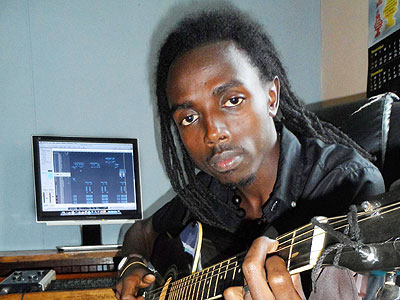David Tuyishime is a young man of enviable achievements, even for someone old enough to be his parent. At just 24, the young music producer is already the proud owner of a fully-fledged music recording studio, Future Records, based in Kimironko that does audio and video.


David Tuyishime is a young man of enviable achievements, even for someone old enough to be his parent. At just 24, the young music producer is already the proud owner of a fully-fledged music recording studio, Future Records, based in Kimironko that does audio and video.
Tuyishime started Future Records from scratch, in 2009, as a struggling and ill-equipped music recording studio, banking solely on an unwavering passion and determination to earn the title of "music producer.”
Six years later, the company has grown beyond his own original dream of music production, to a whole host of inter-related musical ventures:
Under a new parent company, Diamond Dreams, Tuyishime set upon adding four fully-fledged departments; a live band –the Sauti Band, protocol and events management, music tutorial, and artiste management.
Besides managing artistes signed to his label, Tuyishime also manages, oversees and coordinates the entire operations of all departments. And that’s not all. He also doubles as a music producer and video director.
A look at the list of artistes under his stewardship reveals quite a few surprise big names: Alpha Rwirangira and Hope Irakoze (both former Tusker Project Fame winners; Tom Close, and Peace.
"I have many artistes with different contracts, while many others are pending approval,” says the soft-spoken beat maker turned music entrepreneur. "We first see what each artiste is bringing on the table before we sign them. One must demonstrate the ability, both professionally and commercially for them to be signed. We have to be sure if it’s a brand we can work with.”
Usually, he gives each artiste a test-run of about a year, before making up his mind. "Sometimes an artiste has a lot of talent but no discipline; still I can’t work with them.”
When he is not crafting a beat in studio or playing his managerial role, Tuyishime takes time off to offer private music lessons on the studio premises, focusing mainly on the guitar, piano, and drums –his favorite instruments.
Occasionally when he is too caught up, he delegates this role to some of the senior members of the Sauti Band, about which he says proudly: "They are a professional live band. I remember starting the band from a bar that I run at Hotel Tech.”
The band boasts twelve members; seven instrumentalists and five singers. It plays for all artistes signed to the label, but also commercially at other musicians’ concerts.
But it is the music recording bit that takes up most of Tuyishime’s time. It is also the part that is closer to his heart, perhaps because of the long struggle that came before the studio could be called one.
"At the end of 2005, I got my first money from music production, and with it I bought a computer mouse. Immediately I bought it, I said to myself that I’m going to start a studio from this mouse. I vowed to buy things one by one in my one-roomed house, until I achieved a full studio. I started the studio from there, and in fact we used to call it bedroom studio.”
Because he needed the skills but lacked the equipment, the budding producer and singer took to frequenting all music recording studios within his neighborhood, learning on the job but also gathering ideas for his own studio back home.
"I started humble. My production was not so good and not so bad. I think my biggest limitation at that time was lack of access to good studio equipment.” Tired of the low-quality video clips that usually accompanied some of the songs he produced, the young man eventually took matters into his own hands, opening a video editing suite as well.
Today, he shoots videos not only for some of the songs he has produced for his artistes, but also for other singers. Some of his most memorable videos in this regard are; Birakoze, by Kidumu and Alpha, and Honey, by Hope featuring Peace.
While he enrolled for an online video production course to hone his skills behind the camera, he had to hop on a bus all the way to Nairobi, Kenya to acquire similar skills in audio production, which today is his first calling:
"I went to Kenya towards the end of 2005, for a two month audio production course that had been organised by a US –based music producer. You had to send video clips of you playing at least two musical instruments to the organisers. I played piano and drums to qualify for the training,” he says, adding:
"I came back from there knowing I was now a producer,” he says. "I had learnt things like programming, mixing, and mastering.”
Today, his instrument of choice is the piano, and he explains why: "I play drums but piano comes first, because I started playing it when I was only five, and even today, I play it in studio every day.”
A good music producer, to him, is one who has discipline. "You have to understand what the artiste wants first. Some producers are not humane –they think that because they have the skill, the client has to suffer in their hands. A good producer is one who listens to the ideas of other people, is eager to learn, and loves what he does.”
"I love what I do, and I’ll keep widening my knowledge to know better what I do, because I gave my entire life to music.”


